The Testament of Arkadia
| Belgium (Flemish) |
Testament van Arkadia |
Testament Of Arcadia |
12 Jan 1977 |
| France/Canada |
Le testament de l'Arcadie |
The Testament Of The Arcadia |
31 Oct 1977 |
| Italy |
Il testamento degli Arkadi |
The Testament Of The Arkadians |
9 Jan 1977 |
| Japan |
O, God! May New Peace in Space!
|
25 Sep 1977 |
| Poland |
Testament Arkadii |
|
6 Aug 1977 |
| Portugal |
O Testamento de Arkadia |
The Testament of Arkadia |
6 Nov 1976 |
| Spain |
Testamento de Arcadia |
Testament of Arcadia | 23 Dec 1976 |
| Sweden |
Testamentet |
The Testament |
15 Dec 1977 |
| South Africa | Testament Van Arkadia |
Testament of Arcadia | 2 Dec 1977 |
| USA (New York) |
|
|
15 May 1976 |
| USA (San Francisco) |
|
|
3 Jan 1976 |
| UK (ATV) |
|
|
12 Feb 1976 |
| UK (LWT) |
|
|
21 Feb 1976 |
Is it the end for the moon, or the beginning of a new life? In far-off outer space are found the origins of life on Earth itself as the moon's random progress comes to a sudden, inexplicable halt. ITC summary
- The idea came out of a discussion between writer Byrne and director Tomblin.
- Shooting script 5th February 1975
- Shooting script 25th February 1975 (new draft)
- Filmed 11th February-25th February 1975 (first 2 days simultaneously with Dragon's Domain)
- Wrong credits: Lisa Harrow is incorrectly credited as "Liza" Harrow.
- Sylvia Anderson recorded a DVD commentary for this episode:
We were trying to be kind of grown up. We were really just getting into our stride, in this episode, episode 24. It's probably a little slower than some of the other episodes, but quite profound. I think Johnny Byrne was taking a very interesting concept, and more to the point, which was my particular hobby horse, we learned about the characters. They were real people out there.
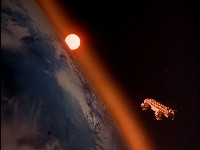
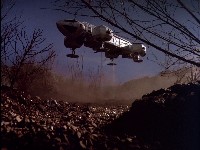
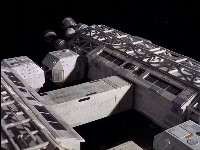
Library tracks:
- "Kabuki Music", traditional.
- "Suite Appassionata - Andante" composed by Serge Lancen, conducted by Paul Bonneau (Chappell Recorded Music Library)
- "Picture Of Autumn" composed by Jack Arel and Pierre Dutour, conducted by Dutour (Chappell Recorded Music Library)
- ITC Music Cue Sheet
Serge Lancen (born 1922, died 2005) was a French composer and classical pianist. Paul Bonneau (born 1918, died 1995) was a French conductor and composer who was a regular on French radio, as well as scoring many French films.
Jack Arel (real name Jacky Azzopardi, born 1943) is a French composer who wrote songs for many French artists (and occasionally international stars including Tom Jones), as well as film and TV scores. Pierre Dutour (born 1931, died 2023) was a French composer, conductor and trumpeter. Dutour and his orchestra recorded a number of albums of library music composed by Arel and himself for Chappell's "Dance and Mood Music" series (volumes 9, 11 and 13 in 1969-1970, and volumes 19 and 21 in 1972-1973). Heard in the cave scene, "Picture Of Autumn" is the second movement of a set of contemporary music based on the seasons on volume 13 (1970).
- Arkady/Arcadia is a mountainous area of Southern Greece, poetically portrayed as an idyllic pastoral paradise of shepherds and music. In classical mythology it is the realm of Pan, who used to inspire lonely travellers with terror (hence the word "panic").
- Sanskrit is the ancient Indic language of the Vedic, the Indo-European people who moved from the Iranian region to North West India about 1500 BC. Vedic Sanskrit is the oldest form and lasted until 200 BC. Classical Sanskrit replaced Vedic Sanskrit and was dominant from about 500 BC to 1000 AD when it split into many modern Indic languages.
Much of the Vedic cultural values have been preserved in the Hindu religion, including the concepts of sacrifice and caste. The Hindu scriptures, the Veda, are in Vedic Sanskrit and date from 1500 BC. Sanskrit had a status similar to Latin in Europe, as a scholarly and scared language; it is still used in Hindu liturgy.
It has a highly inflected and complex grammar, and important similarities to other Indo European languages which made Sir William Jones in the 18th century think it was the root language of all modern languages; his discovery led to the scientific study of languages, called philology in the 19th century (and in Space 1999) but now named linguistics.
- In the 20th century it was realised that Sanskrit, like ancient Greek, Latin and almost all modern European and Asian languages, is derived from a proto-Indo European tongue. This language was spoken in Eastern Europe or Western Asia, most probably in Anatolia (modern Turkey), about 7000-6000 years ago. This area and time also saw the birth of agriculture, the first settled towns, and was the source of major migrations and invasions.
Note that some languages are not related to proto-Indo European; Basque, Etruscan, and languages in Africa, the Far East and the Americas.
English has several words derived ultimately from Sanskrit, including "sugar", "candy" and "orange".
- The earliest possible Sanskrit texts are from the Indus Valley, 3300 BC to 1300 BC, but they are undeciphered.
- The earliest Sanskrit texts are in Brahmi script (100 BC, e.g. Ayodhya inscription). From about the 4th century AD, Sanskit was written in a wide range of regional scripts, dominated by the Nagari script and derivatives. The Arkadia text uses Nagari characters, and is perhaps based on an authentic Indian text, but it does not seem to be real Sanskrit.
- In Alpha by William Latham (2010), Bergman asserts that, while Arkadians did visit Earth and bred with Earth humans (Anna Davis is a direct descendent), the plant species and Sanskrit were taken from Earth to Arkadia by returning Arkadians.
- If Arkadia is one million light years from Earth, and the planet died 25000 years ago, the Arkadians should still be travelling (unless they, like the Moon, use space and time warps to move faster than light).
- Victor says "Gravity or magnetic forces could affect the speed of an object the size of the Moon". In fact only gravity can.
- Without bacteria and microscopic organisms, decomposition of organic matter is reduced to simple mechanical and chemical processes. The petrified trees seen on Arkadia would be plausible. Without the binding of plant roots soils would be stripped back to rock or sand by rain and rivers, although some locations may suffer less erosion and be better preserved. The biggest impact would be on the composition of the atmosphere. The water cycle on land would be altered as forests and grasslands stopped releasing water into the air, causing dramatically drier and warmer climates, probably within a few weeks. The death of ocean plankton would release vast amounts of carbon dioxide, perhaps tripling CO2 within 20 years, which in turn would raise temperatures. Over millions of years, average temperatures could rise to 50 C or more. See New Scientist, "Earth after Life", September 28 2013. (Thanks to Marcus Lindroos).
2 deserters: Luke Ferro, Anna Davis.
- Bergman says there are over 300 people on Alpha. Note by The Metamorph there are just 297.
Alpha Technology:
- Anna uses a computer translator (a yellow/orange 1970s calculator, the Olivetti Divisumma).
- Koenig uses an unseen limpet transmitter on the Eagle (actually the Moonbuggy according to the script). It transmits on "subspace" frequencies. He uses another hyperspace transmitter in The Taybor.
- The silver jackets were first seen in Black Sun. The orange jackets used by the guards were first used in Dragon's Domain and reappear on Picard in The Metamorph and Maya in One Moment Of Humanity
- The moonbuggy is seen, but not driven.
Eagle 1 (initial landing party); 2 (unarmed survey); 3 and 5 (pursuit); 4 (Luke and Anna, left on Arkadia)
Arkadia
Aliens:
Spirits of the Arkadians.
Props:
- Koenig and Anna have binoculars that are props from UFO.
- The water analyser that Helena uses in Matter Of Life And Death is held by Anna (just prior to the skeletons turning into Arkadians).
- This episode contradicts The Full Circle where the Alphans regress into Cro Magnon society, circa 40,000 years ago, 15,000 years before humanity was founded by colonists from Arkadia.
- Ferro's voice is dubbed by Oscar nominated dubbing artist Robert Rietty, who also supplied a credited voice in A B Chrysalis.
- Maya also changes into a kendoka (kendo practitioner) in Bringers Of Wonder part 1. The stuntmen were Eddie Stacey (arranger and double for Koenig) and Gerry Crampton as Ferro.
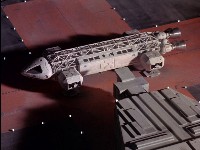
Ferro's Eagle is shown from the exterior with the port-side docked to the boarding tube; on the interior set, the starboard is docked. When the Eagle launches it has turned round so the starboard side faces the tube.
- How did Arkadia die? The radiation evidence suggests either a nuclear war, or an accident with nuclear power, or it might be some natural catastrophe (a collision with a comet?).
- "A strong story of profound human interest. The picture is marred by weak direction and indifferent guest performance." 3/5 Critical Commentary by Johnny Byrne (1975)
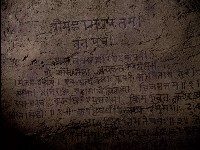
The full text of the Testament Of Arkadia:
I, the guardian, salute you. We are an accused people. We who caused our own destruction have paid the price of ignorance and greed.
To you who seek us out in the ages to come, we salute you. The desolation you find grieves we few who will soon die. Our civilisation gone. Our world, Arkadia, poisoned, dying. We who caused our own destruction.
No need now to tell of that final holocaust when our world flamed in the inferno of a thousand exploding suns. Arkadia is finished, but she, Arkadia, lives on in the bodies, hearts and minds of the few of us who left before the end, taking the seeds of a new beginning. To seek out and begin again in the distant regions of space. Heed now the testament of Arkadia.
Neither past nor future, the future is the past and the testament of Arkadia the link. You who are guided here, make us fertile, help us live again.
External Links
![]() Year 1 - Episode 24
Year 1 - Episode 24 ![]()



